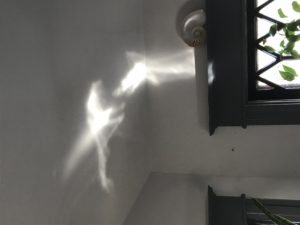Unafraid, Ready
By
Radiance Angelina Petro
Walking through a waist-high field beyond Ypsilanti,
brushing my palms over the whispering grain. The field ends
at a gray, gravel road between an abandoned train station
and dandelion-decorated tracks.
Unsure how far it goes. Resolute I will not turn back.
Passing rusted, graffiti-swirled husks of train cars,
I know I’m being watched from somewhere by someone(s),
and I am unafraid. My jean-jacket flutters a little in the thin-
aired summer wind.
A gray grasshopper helicopters from out of nowhere and lands
some distance ahead. It blends so well with the road it disappears.
As I near, it suddenly lifts in a whir of black-speckled wings, turns, banks,
and again, lands in the road aways. This time, I follow it with my eyes.
I can’t help–and don’t care if I can’t help–wondering.
Barred ticket windows, signs saying keep away from the tracks,
do not pass the yellow line; a stopped clock, stock tracks
with forever locked switches.
The grasshopper rubs its hind legs, readying to catapult itself
into the air. I drop my jacket, take off my t-shirt, unafraid,
and wings emerge from my shoulder blades—
unfolding, veined, transparent, fanning open, parting, thrumming,
ready.



